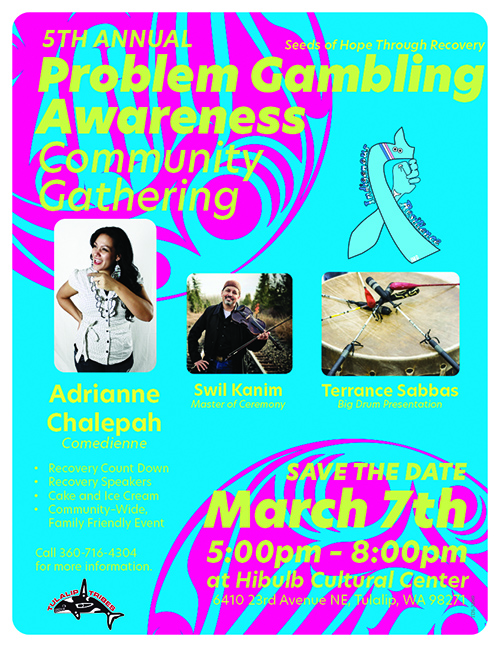
By Kalvin Valdillez, Tulalip News
“It’s so widespread, but the societal norm is that it’s not accepted as a disease,” said Tulalip Problem Gambling Counselor, Robin Johnson. “A lot of people who come and see us will say that they feel like they don’t have a real problem, so this is raising awareness about the fact that problem gambling is a disease and also of the detriments that it causes in real life. There is help. You are not alone.”
The Tulalip Tribes Family Services Problem Gambling Program invites you and yours to a special soiree on the evening of March 7th. A popular community event, and highly anticipated within the recovery circle, the annual Problem Gambling Awareness Gathering promotes healing, education and awareness about an addiction that nationally affects approximately six million individuals and their families each year, according to the National Council on Problem Gambling.
“In most Indigenous communities there’s higher risk of acquiring a gambling disorder,” explained Problem Gambling Coordinator, Sarah Sense-Wilson. “That’s because of co-occurring disorders, mental health, addiction, proximity to gambling establishments and trauma issues. Those things all factor into why Indigenous populations tend to have vulnerability for a gambling disorder.”
For half a decade, the Tulalip Problem Gambling program has actively taken part in a countrywide initiative, Problem Gambling Awareness Month, by hosting local events and providing support to those in need each March. The campaign originally began over fifteen years ago in response to the amount of sports betting surrounding the NCAA March Madness college basketball tournament. Since Tulalip’s involvement in the awareness month, recovering gambling addicts who live at Tulalip, or in nearby cities, have found a sense of community and people who they can relate to and confide in during their journey to recovery.
“The theme for this year’s Problem Gambling Awareness month is ‘Seeds of Hope Through Recovery.’ That comes from the problem gambling recovery community, they’re the ones who conceptualized the theme,” Sarah said. “It impacts everybody in the community at some level, especially in our tribal communities, because we’re so small and tight knit. When I first started here, there was a real void in any collective effort to promote health and wellness around this issue of problem gambling, throughout the region not just at Tulalip. And really, there are no collective efforts or campaigns in Indian country to spotlight this as illness or disease.”
As a people, Native Americans are at the highest risk of developing a gambling habit. A 2019 study conducted by the National Institute on Alcohol and Related Conditions showed that 2.3% of the entire Indigenous population are currently battling the gambling addiction, one of the highest percentages in the nation. Recognizing that this is an issue affecting our tribal people, several Northwest tribes are addressing problem gambling by developing programs to help their people from within the community. Many of those nations, whose programs are still in the infancy stage, often send representatives to participate in events at Tulalip to get a better understanding of how the tribal people are interacting with the program.
Sarah explains, “Our program is a national model program because of the comprehensive services we provide and the expansive work that we’ve created here developing not just treatment, but also prevention, education, community outreach, all of those aspects. Usually, you don’t see that continuum of support services in any other addiction field program. This is also a great opportunity for cross-cultural understanding because we serve non-Natives too. In fact, our services are free and we work with everybody.”
The 5th Annual Problem Gambling Awareness Community Gathering takes place Saturday March 7, from 5:00 p.m. to 8:00 p.m. at the Hibulb Cultural Center. Medicine will be offered all evening in the form of laughter provided by comedienne Adrianne Chalepah, traditional drum circle led by Terrance Sabbas and family, personal testimonials from recovering gambling addicts, as well as soothing tunes from Native violinist, Swil Kanim, who also doubles as the event’s Master of Ceremony.
“We’re trying to keep the same formula, bringing healing through comedic relief and raising awareness, trying to destigmatize the illness so that people are more open to receiving help or seeking services. We want people to understand that this is a disease, a disorder just like diabetes, high blood pressure, there’s no shame in it. We just want to see people get well and live healthy. It really does take a community to make it happen and that’s our goal. These events are not just about calling attention and centering on those in recovery; it’s also about reaching those who are still suffering.”
For more information, please contact the Problem Gambling program at (360) 716-4304.